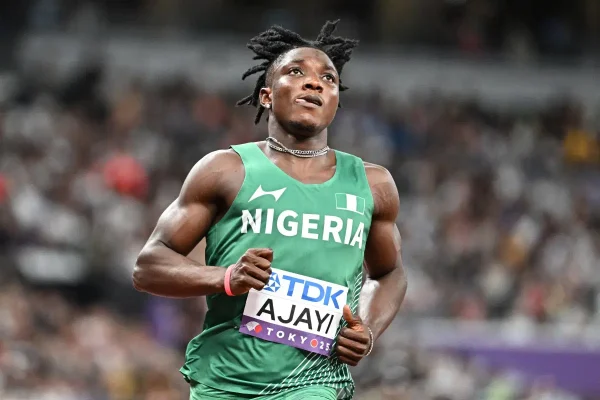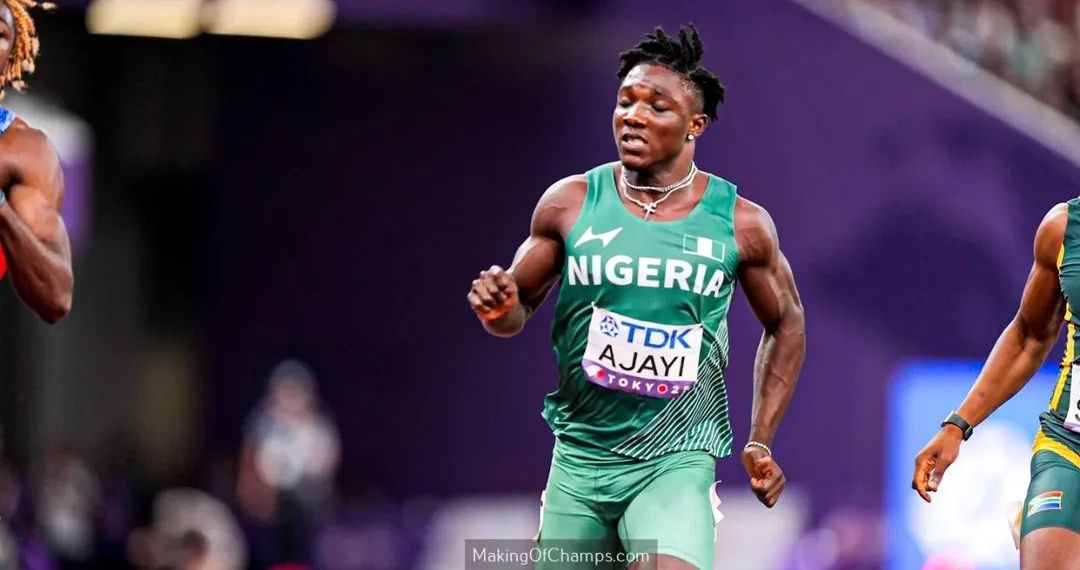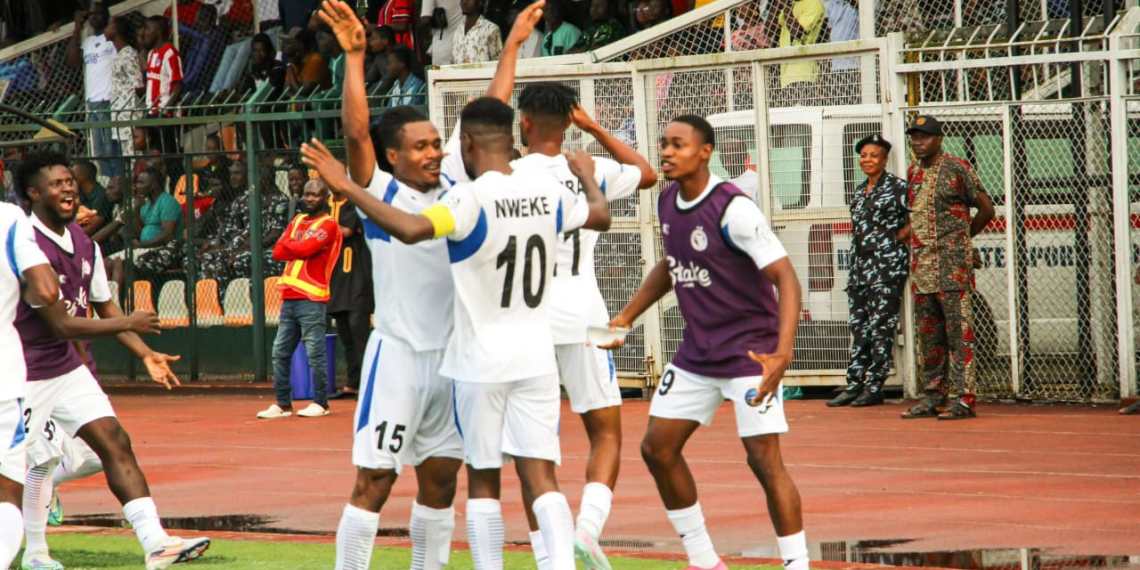In a moment that had millions of Nigerians and West Africans on the edge of their seats, Kayinsola Ajayi’s electrifying sprint into the men’s 100m final at the World Athletics Championships sparked jubilation from sports fans, viewing centres, and social media users across the region. His qualification represents more than just personal victory; it’s a boost for the growing athletics spirit on the continent, inspiring young hopefuls from Lagos to Accra, and reigniting conversations about Africa’s potential on the world’s fastest stage.
According to official results posted by the World Athletics Federation, Ajayi blazed through his semi-final with a remarkable time of 9.93 seconds, narrowly finishing behind defending champion Noah Lyles of the United States, who clocked in at 9.92 seconds. South Africa’s Akani Simbine, already a continental favourite and decorated sprinter, secured third place with 9.96 seconds and also booked a spot in the much-anticipated final.
For many Nigerian fans, Ajayi’s rapid rise caught attention not just for its significance on the track but also for the names he left behind. Ajayi, now being celebrated as one of the most exciting fresh faces in African sprinting, managed to outrun several more experienced global competitors. Most notably, reports confirm 2021 Olympic gold medallist Marcell Jacobs of Italy could only manage sixth in his semi-final, ending his title defence and stunning much of the athletics community.
“Ajayi’s performance is a beautiful surprise,” observed Lagos-based track coach Bisi Oladele. “It shows our sports development is producing stars who can compete shoulder-to-shoulder with the best globally. It brings hope to our aspiring athletes back home in Nigeria and West Africa at large.”
How the Semi-Finals Unfolded
The quest for a spot in the 100m final was fiercely competitive, featuring some of the fastest men from across the globe. In the second semi-final heat, Jamaica’s rising star Kishane Thompson set the track ablaze by clocking a sizzling 9.85 seconds, edging out American Kenny Bednarek. Meanwhile, Oblique Seville, another promising Jamaican sprinter, claimed victory in the third semi in 9.86 seconds, just ahead of Botswana’s Letsile Tebogo who finished in 9.94 seconds.
South Africa’s Gift Leotlela also made headlines by posting a fast 9.97 seconds in the final semi-final heat, ensuring his spot in the final as one of the swiftest non-automatic qualifiers. These times highlight the razor-thin margins and intense competition characterising today’s global sprinting landscape.
Nigeria Back in the Spotlight
Ajayi’s progression not only has personal significance but also thrusts Nigeria back into the conversation as a nation to watch in men’s sprinting. According to Nigerian Athletics Federation spokesperson Femi Ayodele, “This is the result of persistent investment in talent development and grassroots training. We’re proud to see our athletes flying the flag and reminding the world of Nigeria’s rich sprinting legacy.”
Nigeria has previously produced sprint icons such as Olusoji Fasuba and Francis Obikwelu, whose records stand tall in continental history. However, global finals in the men’s 100m have remained elusive for Nigerian athletes over the past decade, making Ajayi’s breakthrough particularly meaningful for both fans and sports officials.
West African Representation and the African Challenge
Across West Africa, Ajayi’s achievement is resonating beyond Nigeria’s borders. Supporters in Ghana, Cote D’Ivoire, and even the broader African sports community have lauded the success as evidence that the continent’s athletes can match the world’s best. According to a recent report by the African Sports Monthly, the surge of West African sprinters in international heats is already shifting the narrative about where the world’s fastest athletes are moulded.
Speaking with Sports24 Ghana, sprint analyst Kwame Adu-Gyamfi commented, “Ajayi’s final qualification is a victory for all of West Africa. It’s proof that more support and infrastructure can lead to even bigger athletic triumphs in the years ahead.”
Global Context and the Race Ahead
The men’s 100m final promises to be a true battle of continents. The eight competitors shaping up for gold in Tokyo—Lyles, Thompson, Tebogo, Seville, Simbine, Leotlela, Ajayi, and Bednarek—bring together diverse sprinting traditions and backgrounds. Each runner’s presence is a testament not only to talent but to years of disciplined training, infrastructure, and national investment in athletics.
Globally, the event is seen as the crown jewel of the Championships. The presence of several African runners in the final line-up signals a shifting balance of sprinting power and underscores Africa’s growing reputation as a hub for athletic excellence.
Despite the celebrations, Ajayi and his fellow African runners face significant challenges against reigning champions and Olympic medallists. Factors such as funding shortfalls, limited access to cutting-edge training facilities, and sporadic global exposure have often hampered African athletes compared to their counterparts from the US or Europe. Nevertheless, their determination and resilience continue to win admiration on the world stage.
Fan Reactions and Social Media Buzz
On the streets, in sports bars, and across social platforms, Nigerian fans are rooting for Ajayi, with the hashtag #AjayiRuns trending on X (formerly Twitter) and heartfelt messages pouring in on Instagram and Facebook. According to Lagos-based sports commentator Tosin Shobajo, “The outpouring of support is a testament to how much hope Nigerian youth place in their athletes. This race is more than a contest—it’s a source of national pride.”
Many are calling for increased government and corporate investment in athletics, recognising that grassroots support and proper facilities are key to nurturing the next generation of champions. Prominent track and field athletes, such as Blessing Okagbare, have also voiced their encouragement, telling the BBC, “Ajayi’s success proves what’s possible when our athletes have belief and backing.”
Looking Forward: The Future of Nigerian and African Sprinting
As anticipation builds for the final, sports analysts and local coaches are calling on stakeholders to leverage Ajayi’s success to inspire broader reforms. Investing in school sports, training facilities, and coaching development could yield a deeper bench of competitors at future global meets.
According to Dr. Chioma Nwosu, sports development expert at the University of Lagos, “Ajayi’s story is an opportunity to galvanise youth, prove the strengths of our existing systems, and highlight the urgent need for more comprehensive support.”
Whatever the outcome of the final, Kayinsola Ajayi’s sprint into the top ranks serves as a beacon of what’s possible for Nigeria and West Africa when talent is nurtured and ambition encouraged. The world will be watching as he lines up for the ultimate showdown—will Nigeria celebrate its first men’s 100m World Champion?
What do you think about Nigeria’s latest sprinting sensation and Africa’s chances in the 100m final? Drop your thoughts in the comments, share your predictions, and follow us for on-the-ground updates from Tokyo and beyond.
Love Nigerian and African sports as much as we do? Connect with local fans, share your experiences from viewing centres, and send us your own sporting stories or opinions! If you have a story to share or want to see your sporting journey featured, email us at story@nowahalazone.com.
Stay in the loop—follow us for more sports updates, breaking news, and exclusive content on Facebook, X (Twitter), and Instagram!
For help or support, reach us at support@nowahalazone.com.










